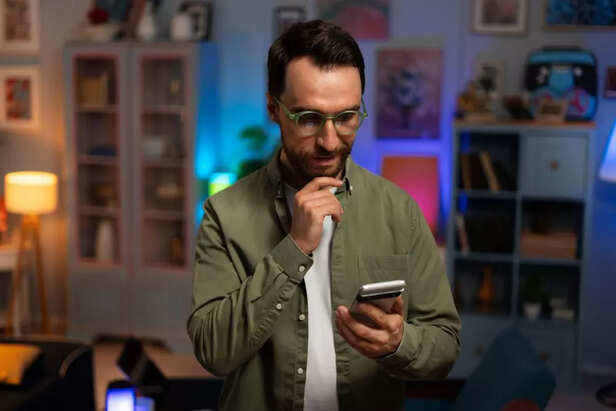You’re Not ‘Too Much’ - You Might Just Have ADHD
Nabila Mulla | Mon, 07 Apr 2025
You’ve seen the memes. You’ve watched the reels. “You lose your keys?” ADHD. “Forget what someone just said?” ADHD. Suddenly, you’re wondering if your entire personality is a symptom. But hold up — let’s take a deep breath and talk about what ADHD really is, why Instagram isn’t your therapist, and how to actually figure out what’s going on in that brilliant brain of yours. This isn’t a boring lecture, I promise. Just facts, feelings, and a sprinkle of fun.

Photo:
You’re lying in bed, phone in hand, mindlessly scrolling through Instagram Reels. A video pops up: “10 signs you might have ADHD (that no one talks about).” They list stuff like interrupting people, zoning out during long conversations, overthinking everything, forgetting where you kept your charger for the 15th time... and suddenly, you’re like, “WAIT. That’s me. That’s literally my life!” Sound familiar? You're definitely not the only one. With so much relatable content online, especially on platforms like Instagram and Facebook, more people than ever are starting to wonder if they might have ADHD. But here's the thing: While it's good to be self-aware, it’s also really easy to get swept up in a trend that might not actually apply to you. So... Do You Think You Might Have ADHD? Let’s break it down. Gently. With humour, honesty, and real information.
1. The Rise of Self-Diagnosis

Let’s be honest: Mental health awareness has come a long way, and that’s amazing. Instagram creators, therapists, and educators are sharing incredible content that helps people understand their minds better.
But there’s a twist — suddenly, everyone feels like they have something. And ADHD? It's kind of the hot topic right now.
Here’s why that’s tricky:
Bottom line? Social media is great for awareness, but it can’t replace a real conversation with a real professional.
2. ADHD 101: What It Actually Is (And Isn’t)

Let’s clear up the confusion. ADHD stands for Attention-Deficit/Hyperactivity Disorder, and it’s not just “being distracted” or “forgetful.” It’s a neurodevelopmental disorder that affects how your brain manages focus, impulses, and energy levels.
ADHD Comes in 3 Types:
Here’s the kicker: everyone zones out once in a while or forgets to reply to messages. What makes ADHD different is the frequency and impact. If it’s messing with your studies, job, relationships, or overall well-being — and it’s been that way for a while — that’s when it’s time to look deeper.
3.

There’s this outdated idea that ADHD is a “kid’s thing” and you just grow out of it. Spoiler: You don’t.
In fact, many adults (especially women and non-binary people) go undiagnosed because their symptoms were missed or misinterpreted as moodiness, carelessness, or emotional sensitivity.
Here’s what ADHD might look like in adults:
If you’ve spent your life wondering why you can’t “get it together” no matter how hard you try, this might be why.
4. Instagram Is Not Your Therapist

Let’s get real for a sec. Watching a 30-second reel about ADHD symptoms can make you feel seen. But that doesn’t mean it’s a diagnosis.
Why you can’t trust social media with something this serious:
Let’s put it this way: Watching videos about broken bones won’t make you an orthopedist. So why trust a meme with your mental health?
5. What Real Diagnosis Looks Like

If you’re genuinely concerned, the best thing you can do is talk to a qualified mental health professional — a psychologist, psychiatrist, or neurologist.
It might feel intimidating, but trust me — getting clarity about your brain is one of the most empowering things you can do.
6. What If You Do Have ADHD?

Okay, let’s say you’ve been diagnosed. First off: big hug. Deep breath. You’re not broken — your brain just works differently.
ADHD isn’t a punishment. It’s a pattern. And once you know it, you can work with it.
Here’s what managing ADHD might look like:
With support, ADHD doesn’t have to limit you — it can actually be your superpower. Many creatives, entrepreneurs, and change-makers have ADHD. It’s all about learning your rhythm.
7. Not Every Quirk Needs a Diagnosis

Listen, it’s okay to feel scattered. We live in a noisy world. Our brains are overstimulated, our to-do lists are endless, and we’re juggling school, jobs, family drama, and a billion WhatsApp groups.
Just because you’re tired, distracted, or overwhelmed doesn’t mean you need a label.
So, instead of rushing to diagnose yourself, ask:
If the answer’s yes — reach out. If not — maybe all you need is rest, better time management, or just someone to talk to.
Your Mind Deserves More Than a Meme

Here’s the tea: Mental health is way too important to leave to Instagram Reels. ADHD is real, valid, and deeply personal — and so is your journey. So if you’re feeling unsure, that’s okay. Get curious. Talk to someone who knows the science. Explore with compassion, not fear. And remember — no matter what you’re dealing with, you’re not alone, and you’re definitely not broken. Your brain is not a trend. It’s you. Own it.
Unlock insightful tips and inspiration on personal growth, productivity, and well-being. Stay motivated and updated with the latest at My Life XP.
Frequently Asked Questions (FAQs)
1. The Rise of Self-Diagnosis

Phone
Let’s be honest: Mental health awareness has come a long way, and that’s amazing. Instagram creators, therapists, and educators are sharing incredible content that helps people understand their minds better.
But there’s a twist — suddenly, everyone feels like they have something. And ADHD? It's kind of the hot topic right now.
Here’s why that’s tricky:
- Relatability ≠ Reality – Just because you nod along to an ADHD reel doesn’t mean you have it.
- Confirmation Bias – You start looking for symptoms in your own behavior and connect dots that might not actually belong together.
- Overlap Alert –
ADHD symptoms look a lot like anxiety, stress, depression, or even burnout. - FOMO Diagnosis – We’re all guilty of Googling our symptoms, but when we do it to fit in or explain away problems without full context, it can do more harm than good.
2. ADHD 101: What It Actually Is (And Isn’t)

Angry Parent
Let’s clear up the confusion. ADHD stands for Attention-Deficit/Hyperactivity Disorder, and it’s not just “being distracted” or “forgetful.” It’s a neurodevelopmental disorder that affects how your brain manages focus, impulses, and energy levels.
ADHD Comes in 3 Types:
- Inattentive Type – Easily distracted, forgetful, frequently losing things, struggling to follow instructions. People often label you as “lazy” or “spacey.”
- Hyperactive-Impulsive Type – Always moving, interrupting, talking a lot, fidgeting, finding it hard to stay seated or wait your turn.
- Combined Type – A mix of the two above.
3. ADHD in Adults : Yep, It’s Real

Headache
There’s this outdated idea that ADHD is a “kid’s thing” and you just grow out of it. Spoiler: You don’t.
In fact, many adults (especially women and non-binary people) go undiagnosed because their symptoms were missed or misinterpreted as moodiness, carelessness, or emotional sensitivity.
Here’s what ADHD might look like in adults:
- Chronic procrastination or forgetfulness
- Time blindness (you totally lose track of time)
- Trouble managing responsibilities or finances
- Emotional ups and downs that feel... intense
- Overthinking or zoning out in conversations
4. Instagram Is Not Your Therapist

Social media
Let’s get real for a sec. Watching a 30-second reel about ADHD symptoms can make you feel seen. But that doesn’t mean it’s a diagnosis.
Why you can’t trust social media with something this serious:
- It’s too simplified. Real mental health conditions are complex, and a checklist with quirky music doesn’t do justice to that.
- You’ll see what you want to see. If you’re already convinced you have ADHD, every little slip-up becomes “proof.”
- It might be something else. Stress, anxiety, trauma, depression, lack of sleep — all can mimic ADHD symptoms.
- You miss the full picture. A professional looks at patterns over time, across different situations, not just how you felt last Tuesday.
5. What Real Diagnosis Looks Like

Quiz
If you’re genuinely concerned, the best thing you can do is talk to a qualified mental health professional — a psychologist, psychiatrist, or neurologist.
Here’s what a proper ADHD diagnosis usually involves:
- Detailed Interviews – They’ll ask about your life, behavior, school history, relationships, routines, etc.
ADHD Symptoms Checklist & Rating Scales – These help track patterns over time.- Input from others – Especially if you’re still in school or living with parents, outside perspectives matter.
- Ruling out other conditions – Like anxiety, learning disabilities, OCD, or even physical health issues.
6. What If You Do Have ADHD?

Therapy
Okay, let’s say you’ve been diagnosed. First off: big hug. Deep breath. You’re not broken — your brain just works differently.
ADHD isn’t a punishment. It’s a pattern. And once you know it, you can work with it.
Here’s what managing ADHD might look like:
- Medication – Stimulants or non-stimulants help many people find focus and calm, without “changing” who they are.
- Therapy – Especially CBT (Cognitive Behavioral Therapy) and ADHD coaching to build healthier habits and routines.
- Lifestyle Tweaks – Visual calendars or color-coded reminders; Short bursts of work with movement breaks; Mindfulness, journaling, or breathwork; Regular sleep and exercise (seriously, life-changing).
7. Not Every Quirk Needs a Diagnosis

Therapy session
Listen, it’s okay to feel scattered. We live in a noisy world. Our brains are overstimulated, our to-do lists are endless, and we’re juggling school, jobs, family drama, and a billion WhatsApp groups.
Just because you’re tired, distracted, or overwhelmed doesn’t mean you need a label.
So, instead of rushing to diagnose yourself, ask:
- Am I able to function the way I want to?
- Are these struggles happening in all areas of my life?
- Are they getting worse or more disruptive over time?
Your Mind Deserves More Than a Meme

Hug
Here’s the tea: Mental health is way too important to leave to Instagram Reels. ADHD is real, valid, and deeply personal — and so is your journey. So if you’re feeling unsure, that’s okay. Get curious. Talk to someone who knows the science. Explore with compassion, not fear. And remember — no matter what you’re dealing with, you’re not alone, and you’re definitely not broken. Your brain is not a trend. It’s you. Own it.
Unlock insightful tips and inspiration on personal growth, productivity, and well-being. Stay motivated and updated with the latest at My Life XP.
Frequently Asked Questions (FAQs)
- Do I actually have ADHD or not?
Only a mental health professional can diagnose ADHD, so it’s best to talk to one if you’re unsure. - Can you overcome ADHD?
You can’t “cure” ADHD, but with the right tools and support, you can manage it really well. - Can people with ADHD have a normal life?
Absolutely—many people with ADHD live full, happy, and successful lives with the right support and strategies.










